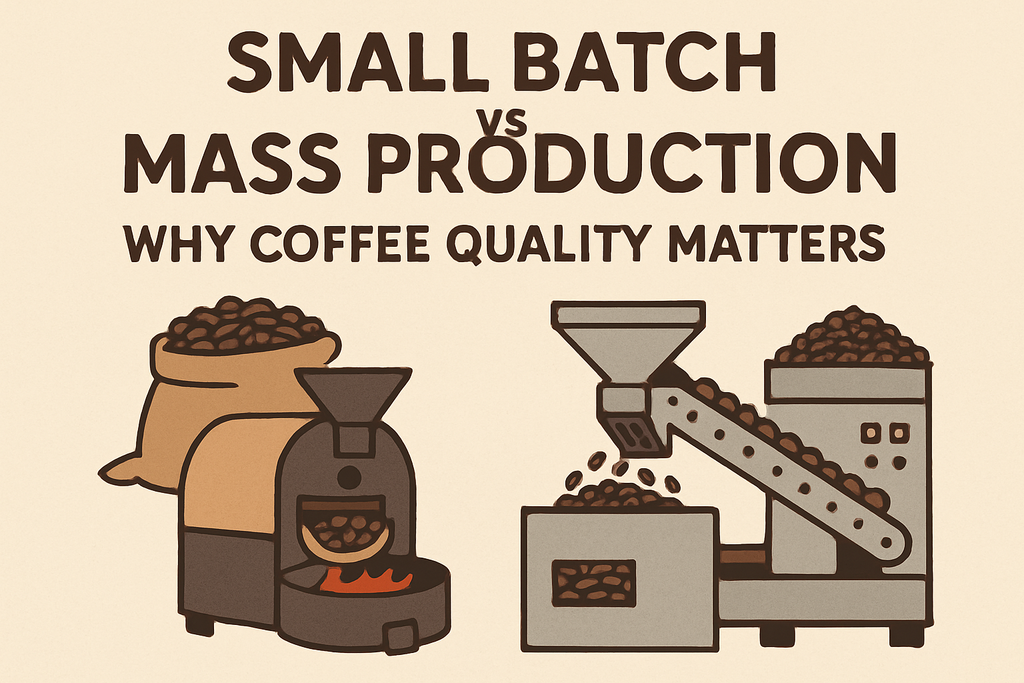
Small Batch vs Mass Production: Why Coffee Quality Matters

Understanding Small Batch Coffee Production
Small batch coffee production represents the artisanal pinnacle of coffee craftsmanship, where meticulous attention to detail transforms raw green beans into extraordinary caffeinated experiences. Unlike industrial-scale operations that prioritize volume over nuance, small batch roasting embraces precision, quality control, and sensory excellence at every stage of the process.
The fundamental distinction lies in batch size and roasting philosophy. Small batch roasters typically process between 5 to 50 pounds of coffee beans per roasting cycle, allowing for unprecedented control over temperature profiles, airflow dynamics, and temporal progression. This intimate scale enables roastmasters to monitor each bean's transformation with surgical precision.
Artisanal roasters possess the flexibility to adjust roasting parameters mid-cycle, responding to subtle changes in bean density, moisture content, and aromatic development. The result? Coffee that exhibits distinct terroir characteristics and flavor complexity that mass production simply cannot replicate.
The Artisanal Roasting Process
Small batch roasting involves sophisticated temperature manipulation techniques that coax optimal flavor compounds from each coffee variety. Roastmasters employ careful heat application curves, monitoring first crack acoustics and visual color development to achieve precise roast profiles. This methodical approach ensures consistent quality while preserving the unique characteristics of single-origin beans.
Temperature ramping rates, development time ratios, and environmental controls become critical variables in small batch operations. Each roasting session represents a deliberate artistic endeavor rather than an automated industrial process.
The Mass Production Reality
Commercial coffee manufacturing operates on dramatically different principles, prioritizing efficiency, cost reduction, and standardization over flavor complexity and quality enhancement. Industrial roasting facilities process thousands of pounds simultaneously, utilizing massive drum roasters that sacrifice individualized attention for sheer volume.
Mass production relies heavily on automated systems and predetermined roasting protocols that cannot adapt to variations in bean characteristics or environmental conditions. The emphasis shifts from craftsmanship to consistency, often resulting in homogenized flavor profiles that lack the distinctive qualities coffee enthusiasts cherish.
Large-scale operations typically employ darker roasting profiles to mask inferior bean quality and create uniformity across diverse coffee origins. This approach effectively eliminates the subtle flavor nuances that distinguish premium coffee varieties from commodity-grade offerings.
Industrial Roasting Limitations
The constraints of mass production become apparent when examining quality control mechanisms and flavor development capabilities. Industrial roasters cannot provide the individualized attention necessary for optimizing each coffee variety's unique characteristics. Batch sizes measured in tons rather than pounds make precise adjustments impossible during the roasting process.
"When you're roasting 2,000 pounds at once, you're essentially averaging out all the unique qualities that make each coffee special. The result is a product that's consistent but unremarkable." - Coffee Industry Analysis
Small Batch Coffee Benefits Quality
The superior quality achieved through small batch roasting manifests in multiple dimensions that directly impact the coffee drinking experience. Freshness retention, flavor complexity preservation, and aromatic intensity represent just the beginning of small batch advantages.
Small batch coffee benefits quality through enhanced control over every production variable. Roastmasters can optimize profiles for specific coffee varieties, adjusting development phases to maximize desirable flavor compounds while minimizing bitter or astringent characteristics. This level of customization remains impossible in mass production environments.
For discerning coffee enthusiasts in Idaho seeking exceptional quality, small batch roasting delivers unparalleled freshness and flavor complexity. Idaho Roasting exemplifies this commitment to excellence, micro-roasting premium beans in Nampa with meticulous attention to quality control and customer satisfaction.
The company's dedication to small batch principles ensures that every one-pound bag contains coffee roasted within days of shipping, preserving volatile aromatic compounds and optimal flavor characteristics that deteriorate rapidly in mass-produced alternatives.
Flavor Profile Enhancement
Small batch roasting enables precise flavor development that highlights each coffee's unique terroir characteristics. Single-origin beans from different regions exhibit distinct flavor profiles when roasted with appropriate techniques and careful attention to development phases.
The controlled environment of small batch operations allows roastmasters to emphasize specific flavor notes, whether enhancing bright acidity in African coffees or developing rich chocolate undertones in Central American varieties. This customization capability represents a fundamental advantage over standardized mass production approaches.
Freshness and Aromatic Preservation
Coffee freshness deteriorates rapidly after roasting, with optimal flavor windows typically lasting 2-4 weeks maximum. Small batch operations excel at managing inventory turnover and ensuring customers receive recently roasted products with peak aromatic intensity.
Mass production systems often involve extended storage periods and distribution chains that compromise freshness before products reach consumers. The result? Coffee that has lost significant flavor complexity and aromatic appeal by the time it reaches your cup.
Quality Control and Consistency
Small batch operations implement rigorous quality control protocols that would be impractical or impossible at industrial scales. Each roasting session undergoes careful evaluation through cupping protocols, visual inspection, and sensory analysis to ensure consistency and excellence.
Quality control in small batch environments involves continuous monitoring of roasting variables, immediate adjustments when necessary, and detailed record-keeping for future replication. This hands-on approach ensures that quality remains paramount throughout the production process.
Idaho Roasting's comprehensive selection demonstrates how small batch producers can maintain consistency across diverse coffee varieties while preserving each blend's unique characteristics. Their curated collections showcase the quality advantages possible through dedicated artisanal approaches.
Cupping and Sensory Evaluation
Professional cupping protocols form the foundation of small batch quality control, involving standardized brewing methods and systematic flavor evaluation. Trained palates assess acidity, body, sweetness, and finish characteristics to ensure each batch meets established quality standards.
These evaluation processes identify potential defects early in production and enable continuous improvement in roasting techniques. Mass production systems cannot implement such detailed sensory analysis due to scale limitations and time constraints.
Sourcing and Bean Selection
Small batch roasters typically maintain direct relationships with coffee producers, enabling access to premium-grade beans that never enter commodity markets. These direct trade relationships ensure ethical sourcing practices and superior raw material quality that forms the foundation of exceptional coffee.
Bean selection criteria in small batch operations emphasize quality metrics like density, moisture content, defect rates, and processing methods. Roasters can afford to be selective, choosing only the finest beans that will showcase their roasting expertise effectively.
Mass production operations rely heavily on commodity-grade beans purchased through conventional channels, where price considerations often outweigh quality factors. The result is a fundamental quality differential that no amount of roasting skill can completely overcome.
Direct Trade Relationships
Direct trade partnerships enable small batch roasters to access exceptional coffee varieties while supporting sustainable farming practices. These relationships provide transparency in sourcing and ensure that quality premiums reach coffee producers directly.
| Sourcing Method | Quality Level | Traceability | Producer Support |
|---|---|---|---|
| Direct Trade | Premium | Complete | High |
| Commodity Market | Standard | Limited | Minimal |
Environmental and Sustainability Considerations
Small batch coffee production typically demonstrates superior environmental stewardship through reduced energy consumption per unit of quality output, minimized packaging waste, and support for sustainable farming practices. Local production and distribution reduce transportation-related carbon emissions significantly.
Artisanal roasters often implement energy-efficient roasting equipment and waste reduction protocols that would be impractical at industrial scales. These practices align with growing consumer awareness of environmental impact and sustainability concerns.
The emphasis on quality over quantity in small batch operations naturally supports sustainable consumption patterns, encouraging consumers to appreciate and savor exceptional coffee rather than consuming large quantities of inferior products.
Local Economic Impact
Small batch roasters contribute meaningfully to local economies through direct employment, supplier relationships, and community engagement. Idaho Roasting's presence in Nampa exemplifies how artisanal coffee operations support local economic development while delivering exceptional products to regional markets.
These businesses often provide personalized service, including office delivery programs and brewing equipment support that larger operations cannot match. The result is enhanced customer relationships and community integration.
Cost Considerations and Value Proposition
While small batch coffee typically commands premium pricing compared to mass-produced alternatives, the value proposition extends far beyond simple cost comparisons. Quality, freshness, and flavor complexity justify higher prices for discerning consumers who appreciate exceptional coffee experiences.
The true cost comparison must consider factors like flavor intensity, brewing efficiency, and satisfaction levels. Premium small batch coffee often requires less product per cup due to superior extraction characteristics and flavor concentration.
Investment in Quality
Coffee enthusiasts increasingly recognize that investing in small batch quality delivers superior value through enhanced daily experiences and support for artisanal craftsmanship. The price differential represents an investment in quality, sustainability, and community support.
- Enhanced flavor complexity and aromatic intensity
- Superior freshness and optimal brewing characteristics
- Support for sustainable farming and local businesses
- Personalized service and expert guidance
Making the Right Choice for Your Coffee Journey
Selecting between small batch and mass production coffee ultimately depends on individual priorities, quality expectations, and appreciation for artisanal craftsmanship. For Idaho residents seeking exceptional coffee experiences, local small batch roasters offer unmatched quality and personalized service.
Consider your coffee consumption patterns, flavor preferences, and values when making this decision. Small batch coffee delivers optimal results for those who view coffee as an experience rather than mere caffeine delivery. The investment in quality pays dividends through enhanced daily enjoyment and support for sustainable business practices.
Does your morning coffee ritual deserve the attention and care that small batch roasting provides? The answer lies in your commitment to quality and appreciation for the artisanal approach that transforms simple beans into extraordinary experiences.
















